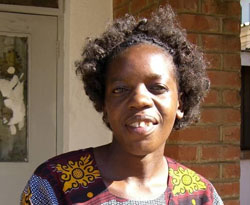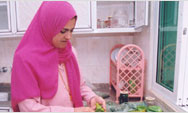You are here » Home » Telling Our Story
Success Story
HIV-positive people
speak out so that others can come forward
Reducing HIV/AIDS’ Social Stigma

Photo: Mgmt Sciences/Chevenee Reavis
By speaking openly at their HIV status, Malawians such as Beatrice Munyowa are raising awareness about HIV/AIDS and services available for those affected by it.
“I don’t fear anything. I just want to talk to people about HIV/AIDS and help people understand that you can still have a full life when you are HIV-positive,” said Beatrice Munyowa, who runs a support group for people living with HIV/AIDS.
The adult HIV/AIDS prevalence rate in Malawi’s Chikwawa District is 20 percent. Three years ago, counseling, testing and treatment services were quite limited. Today, “there has been so much education about HIV that it is almost as commonly known as malaria. Counseling and testing patients used to come through the back door of the health clinics, but now they enter through the waiting room,” a HIV/AIDS counselor at a district hospital said.
With USAID support, the district health management team in Chikwawa and seven other districts have moved to quickly scale-up critical HIV/AIDS services. In 2006, in Chikwawa, nearly 14,000 people voluntarily sought HIV testing, 2,452 persons received outreach visits and 649 accessed anti-retroviral therapy. As services have improved, so has awareness and community mobilization, and the numbers of people seeking assistance has quadrupled since 2004.
After learning that her husband had an affair, Beatrice Munyowa, who lives in Chikwawa, got tested and discovered she was HIV- positive. Although she faced some initial discrimination, she was open about her status so she could raise awareness about the disease.
During a community mobilization visit by the implementing partner, Beatrice learned about a new support group in her area. The community mobilization team used dance and drama to help people understand the importance of knowing their status and that being positive is not a death sentence, as effective treatment is available.
Beatrice now accompanies mobilization teams throughout the district and tells her story. She also manages a support group for people living with HIV/AIDS and their friends and families, which meets twice a month. When a member encounters a challenge, the group finds solutions together. Beatrice brings a message of hope to people who are HIV-positive, saying, “I just want to talk to people about HIV/AIDS and help them understand that you can still have a full life when you are HIV- positive. This is important to me and I will never stop.”
Print-friendly version of this page (533kb - PDF)
Click here for high-res photo
Back to Top ^ | 

